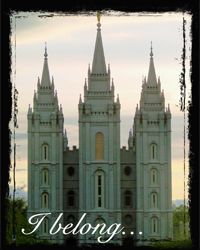Thursday, August 30, 2007
My impressions of Paul
Oh, and I'm equally impressed with how Paul was able to support both himself and his companions on their lengthy missions, probably through his tentmaking efforts, while still bringing the gospel to the Greeks and Jews throughout Asia Minor:
Acts 20:33-35 I have coveted no man's silver, or gold, or apparel. 34 Yea, ye yourselves know, that these hands have ministered unto my necessities, and to them that were with me. 35 I have shewed you all things, how that so labouring ye ought to support the weak, and to remember the words of the Lord Jesus, how he said, It is more blessed to give than to receive.
(Sounds a little bit like King Benjamin doesn't it.)
He was so successful as a missionary that all who dwelt in Asia heard the word of the Lord:
Acts 19:10 And this [Paul’s teaching] continued by the space of two years; so that all they which dwelt in Asia heard the word of the Lord Jesus, both Jews and Greeks.
As Paul is warning the church leaders from Ephesus, we see how concerned he is for the flock that he has nurtured and taught, even to the point of tears:
Acts 20:29-31 For I know this, that after my departing shall grievous wolves enter in among you, not sparing the flock. 30 Also of your own selves shall men arise, speaking perverse things [i.e. they’ll distort the truth and mislead the people], to draw away disciples after them. 31 Therefore watch [i.e. be on your guard], and remember, that by the space of three years I ceased not to warn every one night and day with tears.
Add to this the personal witness of Paul's physical appearance and demeanor from Joseph Smith:
"He is about 5 foot high; very dark hair; dark complexion; dark skin; large Roman nose; sharp face; small black eyes, penetrating as eternity; round shoulders; a whining voice, except when elevated and then it almost resembles the roaring of a Lion." (from Joseph Smith, Teachings of the Prophet Joseph Smith, selected and arranged by Joseph Fielding Smith, p.180)
Consquences of falling asleep in church
Eutychus must have been sitting by the window for fresh air and to keep himself awake. Unfortunately it didn't work and he fell three stories to his death.
Acts 20:6-9 And we sailed away from Philippi after the days of unleavened bread, and came unto them to Troas in five days; where we abode seven days. 7 And upon the first [day] of the week, when the disciples came together to break bread, Paul preached unto them, ready to depart on the morrow; and continued his speech until midnight. 8 And there were many lights in the upper chamber, where they were gathered together. 9 And there sat in a window a certain young man named Eutychus, being fallen into a deep sleep: and as Paul was long preaching, he sunk down with sleep, and fell down from the third loft, and was taken up dead.
It certainly caused Paul some alarm -- but he was able to bless and raise him from the dead.
Acts 20:10-12 And Paul went down, and fell on him, and embracing [him] said, Trouble not yourselves; for his life is in him. 11 When he therefore was come up again, and had broken bread, and eaten, and talked a long while, even till break of day, so he departed. 12 And they brought the young man alive, and were not a little comforted.
In other words, Paul was very MUCH comforted that Eutychus lived.
Trivia for NT Lesson 32
Trivia: What are the seven wonders of the ancient world?
Bonus question: What is “herostratic fame”?
In November, I'm going on a 2-week cruise through the Mediterranean. As it turns out, we will go to four of the sites of the ancient wonders of the world -- the pyramids of Egypt (the only remaining wonder), site of the temple of Artemis/Diana in Ephesus (and referenced in NT Lesson 32 as part of Paul's third missionary journey), site of the Colossus at Rhodes, and Alexandria Egypt, near the site of the ancient lighthouse.
The full list of seven ancient wonders:
1. Pyramids of Egypt (at Giza, outside of Cairo)
2. Hanging gardens of Babylon (in modern-day Iraq)
3. Statue of Zeus at Olympia (about 100 miles west of Athens)
4. Temple of Artemis (Diana) at Ephesus (Turkey)
5. Mausoleum at Helicarnassus (Bodrum, Turkey)
6. Colossus of Rhodes (Island of Rhodes, Greece)
7. Lighthouse of Alexandria (Egypt)
The Temple of Artemis was gigantic. In fact, it was one of the largest temples the Greeks ever built . It was made for the goddess Artemis. Artemis, also known as Diana, was the goddess of wild nature and hunting . The temple was famous for its use of marble and for its size. Everything was made of marble except the tiled covered roof. It was very decorative. All 106 columns were twelve meters high (40 feet ). Note this temple was four times bigger than the Parthenon in Athens.
When he saw the temple, Philon, an Athenian architect, wrote: “He who had laid eyes on it will be convinced that the world of the immortal gods has moved from the heaven to earth.”
So, now the bonus question: Bonus: What is “herostratic fame”?
In 356 B.C. a young man, Herostratus, set fire to the temple of Diana in his quest for fame. After the fire, Herostratus proudly claimed credit in order to secure his place in history. In order to dissuade similar-minded fame-seekers, the Ephesean authorities not only executed Herostratus, but condemned him to a legacy of obscurity by forbidding mention of his name under the penalty of death. Obviously, this harsh stipulation did not preclude Herostratus from achieving his goal. The term “herostratic fame” has come to mean “fame at any cost” and sometimes destruction, crime or terrorism for the purpose of self-glorification.


